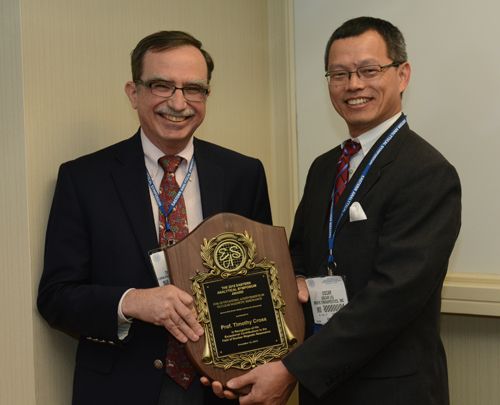Timothy Cross Awarded EAS Honor for Achievements in NMR
Timothy A. Cross has received the 2015 EAS Award for Outstanding Achievements in Nuclear Magnetic Resonance (NMR) spectroscopy. The award was presented to him at the Eastern Analytical Symposium conference in Somerset, New Jersey, on November 16.
Timothy A. Cross has received the 2015 EAS Award for Outstanding Achievements in Nuclear Magnetic Resonance (NMR) spectroscopy. The award was presented to him at the Eastern Analytical Symposium conference in Somerset, New Jersey, on November 16.

Cross is the Earl Frieden Professor of Chemistry and Biochemistry at Florida State University, and the NMR and MRI Program Director at the National High Field Magnetic Field Laboratory in Tallahassee, Florida. His research group has focused on solid-state NMR development for the structural, dynamic, and functional characterization of membrane proteins. Because native protein structures are not dictated alone by their amino acid sequence, but also by their sequence in their native environment, it is important to characterize membrane proteins in an environment that matches their native environment as closely as possible. Using solid-state NMR, Cross’s group has demonstrated that it is possible to characterize membrane protein structure and dynamics in liquid crystalline lipid bilayer environments. This work has led to the novel characterization of a functional mechanism for the M2 proton channel of influenza A, a proven drug target. Recently, his group has characterized a structure of CrgA, a central protein of the cell division apparatus of Mycobacterium tuberculosis, the causative agent for tuberculosis.
Cross also helped write the grant proposal to the National Science Foundation (NSF) that brought the National High Field Magnetic Field Laboratory to Florida State University. He has been a driving force in developing a chemistry and biology mission for the laboratory, while heading up its user program for NMR and magnetic resonance imaging (MRI).
Cross’s research group has published more than 200 papers and benefited from continuous funding from the National Institutes of Health (NIH) for the past 29 years as well as grants from NSF including an NSF Presidential Young Investigator Award the year after he arrived at Florida State. He is also an Alfred P. Sloan Fellow, a Fellow of the American Association for the Advancement of Science, and a Fellow of the Biophysical Society. In 2010 he received the Florida Award from the Florida Section of the American Chemical Society.
Cross received his PhD from the Department of Chemistry at the University of Pennsylvania, Philadelphia, in 1981.
Best of the Week: What You Missed from Pittcon and AAFS
March 14th 2025Top articles published this week include a video interview on the role of near-infrared (NIR) spectroscopy in food and bioanalysis, a recap of an important session at Pittcon, and a dynamic video that summarizes the highlights of the American Academy of Forensic Sciences (AAFS) Conference.
Raman Spectroscopy Aflatoxin Detection Enhances Peanut Safety
March 11th 2025A research team from Jiangsu University has developed a Raman spectroscopy-based method to detect aflatoxin B1 (AFB1) in peanuts with improved accuracy and efficiency. By employing a two-step hybrid strategy integrating backward interval partial least squares (BiPLS) and variable combination population analysis (VCPA), the new model significantly enhances the precision of AFB1 detection, providing a more reliable approach for food safety monitoring.
Advancing NIR and Imaging Spectroscopy in Food and Bioanalysis
March 11th 2025Our full-length interview with Huck covers more than just NIR spectroscopy in food and bio analysis. Spectroscopy sat down with Huck to also discuss current trends going on in spectroscopy, delving into what challenges spectroscopists face today and how they can solve these concerns.